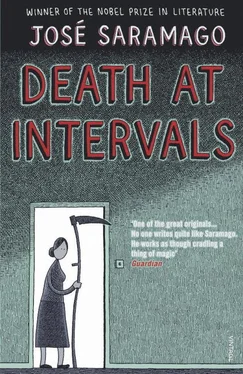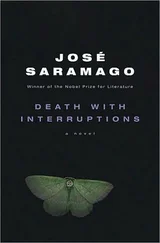José Saramago - Death at Intervals
Здесь есть возможность читать онлайн «José Saramago - Death at Intervals» весь текст электронной книги совершенно бесплатно (целиком полную версию без сокращений). В некоторых случаях можно слушать аудио, скачать через торрент в формате fb2 и присутствует краткое содержание. Город: London, Год выпуска: 2008, ISBN: 2008, Издательство: Vintage Books, Жанр: Современная проза, на английском языке. Описание произведения, (предисловие) а так же отзывы посетителей доступны на портале библиотеки ЛибКат.
- Название:Death at Intervals
- Автор:
- Издательство:Vintage Books
- Жанр:
- Год:2008
- Город:London
- ISBN:978-0-099-50248-7
- Рейтинг книги:5 / 5. Голосов: 1
-
Избранное:Добавить в избранное
- Отзывы:
-
Ваша оценка:
- 100
- 1
- 2
- 3
- 4
- 5
Death at Intervals: краткое содержание, описание и аннотация
Предлагаем к чтению аннотацию, описание, краткое содержание или предисловие (зависит от того, что написал сам автор книги «Death at Intervals»). Если вы не нашли необходимую информацию о книге — напишите в комментариях, мы постараемся отыскать её.
Death does return eventually, but with a new courteous approach – delivering violet warning letters to her victims. But what can death do when a letter is unexpectedly returned?
Death at Intervals — читать онлайн бесплатно полную книгу (весь текст) целиком
Ниже представлен текст книги, разбитый по страницам. Система сохранения места последней прочитанной страницы, позволяет с удобством читать онлайн бесплатно книгу «Death at Intervals», без необходимости каждый раз заново искать на чём Вы остановились. Поставьте закладку, и сможете в любой момент перейти на страницу, на которой закончили чтение.
Интервал:
Закладка:
On the table is a list of two hundred and ninety-eight names, rather fewer than usual, one hundred and fifty-two men and one hundred and forty-six women, and the same number of violet-coloured envelopes and sheets of paper are ready for the next mailing, or death-by-post. Death added to the list the name on the letter that had been returned to sender, underlined it and replaced her pen in the pen holder. If she had any nerves at all, we could say that she felt slightly excited, and with good reason. She had lived for far too long to consider the return of the letter unimportant. It’s easy enough to understand, it takes very little imagination to see why death’s workplace is probably the dullest of all those created since cain killed abel, an incident for which god bears all the blame. Since that first deplorable incident, which, from the moment the world began, demonstrated the difficulties of family life, and right up until the present day, the process has remained unchanged for centuries and centuries and more centuries, repetitive, unceasing, uninterrupted, unbroken, varying only in the many ways of passing from life to non-life, but basically always the same because the result was always the same. The fact is that whoever was meant to die died. And now, remarkably, a letter signed by death, written in her own hand, a letter warning of someone’s irrevocable and unpostponable end, had been returned to sender, to this cold room where the author and signatory of the letter sits, wrapped in the melancholy shroud that is her historic uniform, the hood over her head, as she ponders what has happened, meanwhile drumming on the desk with the bones of her fingers, or the fingers of her bones. She’s slightly surprised to find herself hoping that the letter will be returned again, that the envelope will carry, for example, a message denying all knowledge of the addressee’s whereabouts, because that really would be a new experience for someone who has always managed to find us wherever we were hidden, if, in that childish way, we thought we might escape her. However, she doesn’t really believe that the supposed absence will be marked on the back of the envelope, here the archives are updated automatically with every gesture or movement we make, with every step we take, every change of house, status, profession, habit or custom, if we smoke or don’t smoke, if we eat a lot or a little or nothing, if we’re active or indolent, if we have a headache or indigestion, if we suffer from constipation or diarrhoea, if our hair falls out or we get cancer, if it’s a yes, a no or a maybe, all she will have to do is open the drawer of the alphabetical file, look for the corresponding folder, and there it will all be. And it shouldn’t astonish us in the least if, at the very moment we were reading our own personal file, we saw instantaneously recorded there the sudden pang of anxiety that froze us. Death knows everything about us, and that perhaps is why she’s sad. If it’s true that she doesn’t smile, this is only because she has no lips, and this anatomical lesson tells us that, contrary to what the living may believe, a smile is not a matter of teeth. There are those who say, with a sense of humour that owes more to a lack of taste than it does to the macabre, that she wears a kind of permanent, fixed grin, but that isn’t true, what she wears is a grimace of pain, because she’s constantly pursued by the memory of the time when she had a mouth, and her mouth a tongue, and her tongue saliva. With a brief sigh, she took up a sheet of paper and began writing the first letter of the day, Dear madam, I regret to inform you that in a week your life will end, irrevocably and irremissibly. Please make the best use you can of the time remaining to you, yours faithfully, death. Two hundred and ninety-eight sheets of paper, two hundred and ninety-eight envelopes, two hundred and ninety-eight names removed from the list, this is not exactly a killingly hard job, but the fact is that when she reaches the end, death is exhausted. Making that gesture with her right hand with which we’re already familiar, she despatched the two hundred and ninety-eight letters, then, folding her bony arms on the desk, she rested her head on them, not in order to sleep, because death doesn’t sleep, but in order to rest. When, half an hour later, once recovered from her tiredness, she raised her head, the letter that had been returned to sender and sent again was back, right there before her empty, astonished eye sockets.
If death had dreamed hopefully of some surprise to distract her from the boredom of routine, she was well served. Here was that surprise, and it could hardly be bettered. The first time the letter was returned could have been put down to a mere accident along the way, a castor come off its axle, a lubrication problem, a sky-blue letter in a hurry to arrive that had pushed its way to the front, in short, one of those unexpected things that happen inside machines, or, indeed, inside the human body, and which can throw out even the most exact calculations. The fact that it had been returned twice was quite different, it clearly showed that there was an obstacle at some point along the road that should have taken it straight to the home of the addressee, an obstacle that sent the letter rebounding back to where it had come from. In the first instance, given that the return had taken place on the day after it had been sent, it was still possible that the postman, having failed to find the person to whom the letter should have been delivered, instead of putting the letter through the letter-box or under the door, had returned it to the sender, but omitted to give a reason. All this was pure supposition, of course, but it could explain what had happened. Now, however, things were different. Between coming and going, the letter had taken less than half an hour, probably much less, for it was there on the desk when death raised her head from the rather hard resting-place of her forearms, that is from the cubit and the radius, which are intertwined for that very purpose. A strange, mysterious, incomprehensible force appeared to be resisting the death of that person, even though the date of his demise had been fixed, as it had for everyone, from the day of his birth. It’s impossible, said death to the silent scythe, no one in this world or beyond has ever had more power than I have, I’m death, all else is nothing. She got up from her chair and went over to the filing cabinet, from which she returned with the suspect file. There was no doubt about it, the name agreed with that on the envelope, so did the address, the person’s profession was given as cellist and the space for civil status was blank, a sign that he was neither married, widowed or divorced, because in death’s files the status of bachelor is never recorded, well, you can imagine how silly it would be for a child to be born, an index card filled out, and to note down, not his profession, because he wouldn’t yet know what his vocation would be, but that the new-born’s civil status was bachelor. As for the age given on the card that death is holding in her hand, we can see that the cellist is forty-nine years old. Now, if we needed proof of the impeccable workings of death’s archives, we will have it now, when, in a tenth of a second, or even less, before our own incredulous eyes, the number forty-nine is replaced by fifty. Today is the birthday of the cellist whose name is on the card, he should be receiving flowers not a warning that in a week’s time he’ll be dead. Death got up again, walked around the room a few times, stopped twice as she passed the scythe, opened her mouth as if to speak or ask an opinion or issue an order, or simply to say that she felt confused, upset, which, we must say, is hardly surprising when we think how long she has done this job without, until now, ever having been shown any disrespect from the human flock of which she is the sovereign shepherdess. It was then that death had the grim presentiment that the incident might be even more serious than had at first seemed. She sat down at her desk and started to leaf back through last week’s list of the dead. On the first list of names from yesterday, and contrary to what she had expected, she saw that the cellist’s name was missing. She continued to turn the pages, one, then another, then another and another, one more, and only on the eighth list did she find his name. She had erroneously thought that the name would be on yesterday’s list, but now she found herself before an unprecedented scandal: someone who should have been dead two days ago was still alive. And that wasn’t the worst of it. The wretched cellist, who, ever since his birth, had been marked out to die a young man of only forty-nine summers, had just brazenly entered his fiftieth year, thus bringing into disrepute destiny, fate, fortune, the horoscope, luck and all the other powers that devote themselves by every possible means, worthy and unworthy, to thwarting our very human desire to live. They were all utterly discredited. And how am I going to put right a mistake that could never have happened, when a case like this has no precedents, when nothing like it was foreseen in the regulations, thought death, especially when the man was supposed to have died at forty-nine and not at fifty, which is the age he is now. Poor death was clearly beside herself, distraught, and would soon start beating her head against the wall out of sheer distress. In all these thousands of centuries of continuous activity, there had never been a single operational failure, and now, just when she had introduced something new into the classic relationship between mortals and their one and only causa mortis, her hard-won reputation had been dealt the severest of blows. What should I do, she asked, what if the fact that he didn’t die when he should have has placed him beyond my jurisdiction, how on earth am I going to get out of this fix. She looked at the scythe, her companion in so many adventures and massacres, but the scythe ignored her, it never responded, and now, oblivious to everything, as if weary of the world, it was resting its worn, rusty blade against the white wall. That was when death came up with her great idea, People say that there’s never a one without a two, never a two without a three, and that three is lucky because it’s the number god chose, but let’s see if it’s true. She waved her right hand, and the letter that had been returned twice vanished again. Within two minutes it was back. There it was, in the same place as before. The postman hadn’t put it under the door, he hadn’t rung the bell, and there it was.
Читать дальшеИнтервал:
Закладка:
Похожие книги на «Death at Intervals»
Представляем Вашему вниманию похожие книги на «Death at Intervals» списком для выбора. Мы отобрали схожую по названию и смыслу литературу в надежде предоставить читателям больше вариантов отыскать новые, интересные, ещё непрочитанные произведения.
Обсуждение, отзывы о книге «Death at Intervals» и просто собственные мнения читателей. Оставьте ваши комментарии, напишите, что Вы думаете о произведении, его смысле или главных героях. Укажите что конкретно понравилось, а что нет, и почему Вы так считаете.












